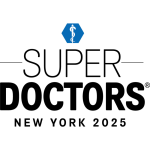

Bruce Robinson, MD is pioneering a transformative new treatment option for the most common skin cancers: Basal Cell Carcinoma (BCC) and Squamous Cell Carcinoma (SCC).
A combination of Fractional Laser therapy and topical medication is producing dramatic results: almost complete elimination of BCCs and SCCs, requiring only ONE very short treatment, with minimal disruption for the patient and an excellent visual result.
Using fractional lasers to wipe out BCCs or SCCs promises to open a whole new chapter in skin cancer treatment, and Dr. Robinson is expanding his research and healing in this area.
Basal Cell Carcinoma (BCC) is a type of skin cancer that can affect anyone, but certain factors can increase the risk of its development. If you fall into any of the following categories, you may have a greater likelihood of developing BCC:
Squamous Cell Carcinoma (SCC) is another common form of skin cancer, and certain factors can increase the risk of developing SCC:
Recognizing the signs of Basal and Squamous Cell Carcinomas is crucial for early detection and effective treatment. These cancers can manifest in various forms, including:
While no one is immune to skin cancer, it is essential for individuals with these risk factors to be vigilant about monitoring their skin for any unusual changes, such as persistent sores, rough or scaly patches, or changes in existing moles. Regular skin checks by a dermatological specialist are crucial for early detection and timely intervention.
The efficacy and benefits of fractional laser treatment for Basal and Squamous Cell Carcinoma (BCC and SCC) are indeed impressive and offer a multitude of advantages for patients:
In summary, fractional laser therapy emerges as a highly effective, safe, and patient-friendly approach to treating Basal and Squamous Cell Carcinomas. Its non-invasive nature, quick healing, minimal scarring, and efficacy in preventing recurrences make it an valuable option for a diverse range of patients seeking effective and aesthetically pleasing skin cancer treatment.
The Fractional laser, a tool typically employed for skin resurfacing to enhance appearance, has found a groundbreaking application in the hands of Dr. Robinson for the treatment of Basal and Squamous Cell Carcinomas. Here's an exploration of how and why this innovative approach works:
In the realm of dermatology, the journey of treating skin cancers often unfolds in a series of delicate decisions, aiming to balance efficacy, patient comfort, and cosmetic outcomes. For over three decades, I have been privileged to witness the evolution of treatments, but none have been as rewarding and transformative as the fractional laser approach in the case of my patient, RL.
RL, a resilient individual, had battled multiple skin cancers over the years, navigating through surgical excisions and recoveries. However, recent developments in his health, including the onset of Parkinson's disease and confinement to a wheelchair, presented new challenges. As fate would have it, RL was diagnosed with two basal cell carcinomas on his face and a squamous cell carcinoma on his chest, demanding prompt attention.
Traditionally, surgical options, including Mohs surgery, would have been the norm. However, the unique circumstances surrounding RL’s health prompted a reevaluation of the treatment approach. The fractional laser, coupled with a topical medication regimen spanning only five days, emerged as a beacon of hope.
The decision to opt for fractional laser treatment was rooted in its ability to offer numerous advantages over traditional surgical methods. The most striking benefit was the efficiency and convenience it brought to someone like RL, whose mobility challenges made traditional procedures nearly impossible. The fractional laser treatment took a mere 5 minutes per lesion, allowing RL to have all three skin cancers addressed in less than 15 minutes during a single visit...
Skin concerns should never be taken lightly, and early detection can make a significant difference in treatment outcomes. Early signs of Basal and Squamous Cell Carcinoma can manifest in various ways, and prompt evaluation is crucial. If you've noticed any changes in your skin, such as a pink or reddish spot, rapidly growing growths, or persistent sores that refuse to heal, we strongly encourage you to reach out to our office.
Dr. Robinson, a board-certified dermatologist with over 30 years of experience, is here to assist you. His expertise allows for a thorough examination and accurate diagnosis of any skin irregularities you may be experiencing. Fractional Laser has proven to be an effective and innovative solution for treating various skin conditions including skin cancers, providing optimal results under Dr. Robinson's skilled hands.
We welcome the opportunity to address your questions and provide you with the information you need to make an informed decision. To schedule an appointment or if you have any inquiries, please don't hesitate to call our office at 212-750-7121 or complete the adjacent form.
In a world where battling skin cancers often leaves behind scars and lengthy recovery times, I sought -- and found -- a different path. I discovered the potential of fractional laser therapy coupled with a specialized topical medication.
The concept was simple yet revolutionary - the laser would create microscopic treatment zones in the skin to destroy the skin cancer while allowing the topical medication to penetrate deeply and target the cancerous cells effectively. Not only would this treatment clear the current skin cancers, but it also held the promise of reducing the likelihood of future occurrences at the treated site, thanks to the combined effects of the laser and the topical medication.
With each successful treatment, I have found renewed purpose in helping patients navigate their skin cancer journey with minimal complications. My passion for using cutting-edge technology to clear skin cancers while preserving the natural beauty of my patients drove me to explore new possibilities and reach more individuals in need. With each new testimonial from satisfied patients, I am proud knowing that I found a way to help others avoid the burden of scars and lengthy healing times in their battle against skin cancer.


